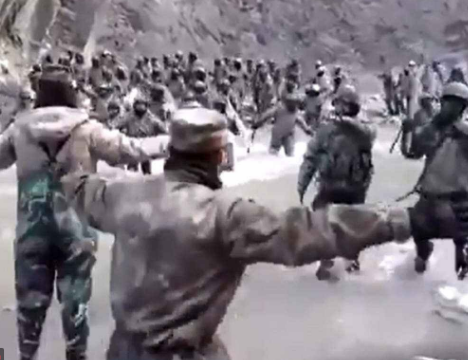New Delhi: As many as 26 out of 65 Patrolling Points (PP) in Eastern Ladakh, which were earlier patrolled regularly by the Indian Security Forces, have been lost by India due to ‘restrictive or no patrolling’ by the forces, according to a research paper by senior police officer PD Nitya.
Superintendent of Police (Leh Ladakh) PD Nitya has said the Chinese have a strong economic and strategic need in the eastern border sector and they are aggressively building up their army to dominate the unfenced areas marked by the PPs on the Indian side to lay their claim on the area for further domination. The research paper was submitted at last week’s the annual All-India Conference of Director Generals/Inspector Generals of Police in Delhi.
“Presently there are 65 PPs starting from Karakoram pass to Chumur which are to be patrolled regularly by the ISFs. Out of 65 PPs, our presence is lost in 26 PPs; 5-17, 24-32, 37, 51, 52, and 62 due to restrictive or no patrolling by the ISFs. Later on, China forces us to accept the fact that, as such areas have not seen the presence of ISFs or civilians for long, the Chinese were present in these areas. This leads to a shift in the border under the control of ISFs towards the Indian side and a “buffer zone” is created in all such pockets which ultimately leads to the loss of control over these areas by India. This tactic of the People’s Liberation Army (PLA) to grab land inch-by-inch is known as “Salami slicing”,” the report said.
“PLA has taken advantage of the buffer areas in the de-escalation talks by placing their best cameras on the highest peaks and monitoring the movement of our forces. This peculiar situation can be seen at Black top, Helmet top mountains in Chushul, at Demchok, at Kakjung, at Gogra hills in Hot springs and at Depsang plains near Chip Chap river,” the report said.
According to the report, the extremely harsh climate, difficult terrain, and remoteness of the area affect the morale and motivation of jawans and officers on the ground which only reminds them to start a reverse countdown of their deployment time and each unit wants to complete their tenure and return back to plains.
The Indian Army, according to the report, has placed many restrictions on the movement of civilians and grazers near the forward areas on the Indian side, indicating their ‘play safe’ strategy that they do not want to annoy PLA by giving them the chance to raise objections on the areas being claimed as disputed.
“Till September 2021, senior officers of the district administration and security forces would easily patrol Karakoram Pass (35 km from DBO) in the DBO sector, however, restrictions in the form of check posts were placed by the Indian Army since December 2021 at DBO itself to stop any such movement towards Karakoram Pass as PLA had installed cameras and they would immediately raise objections on the movement from Indian side if not informed beforehand. This form of restrictive approach has affected our assertiveness and areas which were much accessible from our side became an informal ‘buffer’ zone,” the report said.
“Recently the deal of disengagement achieved at PP 15,16, by ISFs resulted in the loss of pasture lands at Gogra hills, while the same has been lost in the north bank, Kakjungareas. Over the years, this has resulted in the loss of livelihood and change in lifestyle patterns of border villages which has led to migration. Shrinking grazing areas also leads to infighting within communities, for example, the Rebos of Chumur cannot go beyond Nepali Basti for grazing and come in conflict with the Korzok area Rebos who refuse to allow them in their grazing areas. These issues also badly affect the civil-military liaison,” the report said.
The conference covered various aspects of policing and national security, including counter-terrorism, counter-insurgency and cybersecurity. Prime Minister Narendra Modi, Union Home Minister Amit Shah, and National Security Adviser Ajit Doval, among others, attended the three-day meeting.
PNN
